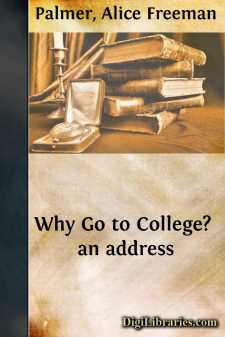Categories
- Antiques & Collectibles 13
- Architecture 36
- Art 48
- Bibles 22
- Biography & Autobiography 813
- Body, Mind & Spirit 142
- Business & Economics 28
- Children's Books 15
- Children's Fiction 12
- Computers 4
- Cooking 94
- Crafts & Hobbies 4
- Drama 346
- Education 46
- Family & Relationships 57
- Fiction 11828
- Games 19
- Gardening 17
- Health & Fitness 34
- History 1377
- House & Home 1
- Humor 147
- Juvenile Fiction 1873
- Juvenile Nonfiction 202
- Language Arts & Disciplines 88
- Law 16
- Literary Collections 686
- Literary Criticism 179
- Mathematics 13
- Medical 41
- Music 40
- Nature 179
- Non-Classifiable 1768
- Performing Arts 7
- Periodicals 1453
- Philosophy 64
- Photography 2
- Poetry 896
- Political Science 203
- Psychology 42
- Reference 154
- Religion 513
- Science 126
- Self-Help 84
- Social Science 81
- Sports & Recreation 34
- Study Aids 3
- Technology & Engineering 59
- Transportation 23
- Travel 463
- True Crime 29
Why Go to College? an address
Categories:
Description:
Excerpt
To a largely increasing number of young girls college doors are opening every year. Every year adds to the number of men who feel as a friend of mine, a successful lawyer in a great city, felt when in talking of the future of his four little children he said, "For the two boys it is not so serious, but I lie down at night afraid to die and leave my daughters only a bank account." Year by year, too, the experiences of life are teaching mothers that happiness does not necessarily come to their daughters when accounts are large and banks are sound, but that on the contrary they take grave risks when they trust everything to accumulated wealth and the chance of a happy marriage. Our American girls themselves are becoming aware that they need the stimulus, the discipline, the knowledge, the interests of the college in addition to the school, if they are to prepare themselves for the most serviceable lives.
But there are still parents who say, "There is no need that my daughter should teach; then why should she go to college?" I will not reply that college training is a life insurance for a girl, a pledge that she possesses the disciplined ability to earn a living for herself and others in case of need, for I prefer to insist on the importance of giving every girl, no matter what her present circumstances, a special training in some one thing by which she can render society service, not amateur but of an expert sort, and service too for which it will be willing to pay a price. The number of families will surely increase who will follow the example of an eminent banker whose daughters have been given each her specialty. One has chosen music, and has gone far with the best masters in this country and in Europe, so far that she now holds a high rank among musicians at home and abroad. Another has taken art, and has not been content to paint pretty gifts for her friends, but in the studios of New York, Munich, and Paris, she has won the right to be called an artist, and in her studio at home to paint portraits which have a market value. A third has proved that she can earn her living, if need be, by her exquisite jellies, preserves, and sweetmeats. Yet the house in the mountains, the house by the sea, and the friends in the city are not neglected, nor are these young women found less attractive because of their special accomplishments.
While it is not true that all girls should go to college any more than that all boys should go, it is nevertheless true that they should go in greater numbers than at present. They fail to go because they, their parents and their teachers, do not see clearly the personal benefits distinct from the commercial value of a college training. I wish here to discuss these benefits, these larger gifts of the college life,—what they may be, and for whom they are waiting.
It is undoubtedly true that many girls are totally unfitted by home and school life for a valuable college course. These joys and successes, these high interests and friendships, are not for the self-conscious and nervous invalid, nor for her who in the exuberance of youth recklessly ignores the laws of a healthy life. The good society of scholars and of libraries and laboratories has no place and no attraction for her who finds no message in Plato, no beauty in mathematical order, and who never longs to know the meaning of the stars over her head or the flowers under her feet. Neither will the finer opportunities of college life appeal to one who, until she is eighteen (is there such a girl in this country?), has felt no passion for the service of others, no desire to know if through history or philosophy, or any study of the laws of society, she can learn why the world is so sad, so hard, so selfish as she finds it, even when she looks upon it from the most sheltered life. No, the college cannot be, should not try to be, a substitute for the hospital, reformatory or kindergarten....


